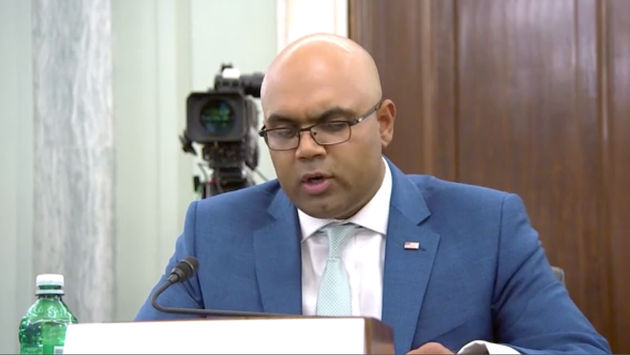A traveler uses his mobile phone next to a departures board showing a cancelled Kuwait…

Congress Hears Testimony on Importance of Infrastructure, Brand USA to Travel Recovery
The Subcommittee on Tourism, Trade, and Export Promotion held a hearing on “Legislative Solutions to Revive Travel and Tourism and Create Jobs,” which included testimony on its Omnibus Travel and Tourism Act of 2021.
The hearing, led U.S. Senator Jacky Rosen (D-NV), chair of the committee, included a panel of leading travel and tourism industry experts, including Tori Emerson Barnes, Executive Vice President of Public Affairs and Policy, U.S. Travel Association; Christopher Bidwell, Senior Vice President of Security, Airports Council International–North America; Chirag Shah, Senior Vice President of Federal Affairs, American Hotel and Lodging Association; and Suzanne Neufang, CEO, Global Business Travel Association.
ADVERTISING
Rosen began the hearing, highlighting the positive trends that are currently buoying the industry such as the administration’s move to reopen U.S. travel to those who are fully vaccinated.
“It is just one more sign that the industry is in the process of slowly recovering,” said Rosen. “Thankfully, consumers are planning leisure travel again.”
Rosen addressed efforts to help assist the travel and tourism industry in its recovery such as the Paycheck Protection Program and the Shuttered Venues Operator Grant. She also noted that the Omnibus Travel and Tourism Act would take further steps at helping the industry make strides to not only recover but to thrive in the future. An example she highlighted is the proposed addition of an assistant secretary in the Department of Commerce who is focused on travel and tourism as well as further investment in Brand USA.
Senator Rick Scott (R-FL), who also serves on the committee, noted the importance of a robust travel and tourism industry in the country.
In her testimony U.S. Travel’s Emerson Barnes outlined three ways Congress could begin to restart travel by providing continued economic relief for impacted travel businesses, enacting stimulus measures to spur travel demand and accelerate rehiring, including the Hospitality and Commerce Jobs Recovery Act (S. 477) and the Restoring Brand USA Act (S. 2424) and making long-term investments to build a more modern and competitive travel industry, including investments in travel infrastructure, streamlining aviation security, and elevating federal leadership in travel policymaking.
These strategies were largely echoed by other panelists.
Congress can accelerate a safe return to travel. 1. Continued relief. 2. Stimulus to spur demand 3. Investment
In her testimony, GBTA’s Neufang highlighted the need for international companies to know that it is safe to come to the U.S. and advocated for the Visit America program. She also pointed to the need to streamline visas to the country as well as passport services, which are taking months rather than weeks to process in the current pandemic climate.
Neufang also noted that it will take a long time for business travel to make a comeback.
“As we look ahead, the business travel industry is still recovering, and will be for the near future,” said Neufang. “That is why it is so important that government and business work together to end the pandemic and to increase vaccination uptake.”
Security, Airports Council International Bidwell noted the need for the reopening of U.S. borders. He also called for investment in infrastructure and hiring.
“Once international travel resumes Congress must ensure there are sufficient numbers of CBP officers, TSA officers and technology in place to keep security checkpoints and federal inspection stations open, operational and safe,” he said. “Long passenger queues create security vulnerabilities associated with large groups of people congregating in public areas. In addition, there is the potential for misconnecting checked baggage and passengers who miss their intended flights.
Bidwell also praised the inclusion of legislation in the omnibus bill for the Ensuring Health Safety in the Skies Act, which passed the Senate unanimously last year. ACI-NA strongly supports this provision, as well as the TSA pilot program for one-stop security. This program would allow international travelers to check their luggage all the way to their final destination without having to retrieve it before their domestic connections.
Bidwell also expressed support for the idea of having officials within the Departments of Commerce and Transportation who would be able to coordinate and advocate for policies that would expand travel and tourism opportunities.
AHLA’s Shah mirrored his colleagues in his support for the omnibus bill’s inclusion of the Visit America Act.

“Visit America reinforces national travel and tourism strategy by charging the Commerce Department, through consultation with the U.S. Travel and Tourism Advisory Board and Tourism Policy Counsel to submit a 10-year growth strategy to identify goals and necessary resources to achieve them,” he said. The plan will not only consider recommendations on recovery from COVID-19, but also a long-term vision for continued economic development within the sector.”
He also expressed the hospitality industry’s need for the Save Hotel Jobs Act.
“The Save Hotel Jobs Act would create a bridge for our distressed sector by providing payroll and benefits assistance for our employees until hotel guests return and the travel sector begins to experience a more even recovery,” he said. The bill provides grants to hotels that can demonstrate a loss of at least 40 percent of gross receipts during a three-month period in 2020, compared to the same period in 2019. All grant funds support hotel workers and must be used exclusively on payroll and benefits including wages, leave, healthcare plan expenses, retirement, and payroll taxes.”
Shah also recommended Congress pass the Hospitality and Commerce Job Recovery Act, which he said will help jumpstart the industry by incentivizing businesses to book and plan conventions, trade shows and large group events with tax credits.




